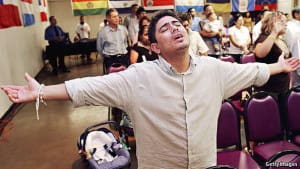
America´s Hispanics: Faith – Pick and mix
 Even in religion, America offers more choice
Even in religion, America offers more choice
AS MANY AS 600,000 American Latinos “defect” from Roman Catholicism to Protestant churches each year, according to Andrew Greeley, a scholar of religion. Most join Pentecostal and evangelical churches. The journey can be stressful, concedes Jesse Miranda, a Latino Pentecostal elder statesman. Not long ago he was approached by a Hispanic congregant who had left the Catholic church a year earlier. She anxiously asked: “But where is Jesus on the cross?” Ah, in our church, Christ is risen, Mr Miranda explained.
The difference goes beyond theology, suggests Mr Miranda, who is based in Los Angeles, home to almost 5m Catholics, some 70% of whom are Hispanic. He describes a Catholic church with a reverence for suffering, linked to the deep “fatalism” of a Latin American continent conquered by the Spanish crown: “The more Latino you are, the more you carry Jesus on the cross.” Yet, he points out, migrants do not move to another country to suffer, they move for a better life.
The point is made more bluntly by Samuel Rodriguez, president of the National Hispanic Christian Leadership Conference, an umbrella body for more than 40,000 Pentecostal and evangelical Latino churches in America and Puerto Rico. The Catholic church in Latin America is “an extension of the bureaucratic state”, he charges, and offers only indirect access to God through the Virgin Mary and the priesthood. Worse, Catholics are told that salvation awaits in another life—and in the meantime, blessed are the poor. In contrast, evangelical churches offer a personal relationship with Jesus Christ, leading to a blessed life here and now. “You get to America, the land of milk and honey, and you get to choose,” says Mr Rodriguez, a dapper figure in a well-cut blazer and aviator sunglasses.
Hispanic Catholics cheered the election of Pope Francis, an Argentine. The new pope has welcomed the rise of Charismatic Catholicism, which marries traditional theology with services that may include Hispanic rock music, faith-healing and in some cases speaking in tongues. But Charismatic services are merely a bridge to even more defections, declares Mr Rodriguez. “If you are involved in a Charismatic service today, in ten years’ time—inevitably—you are going to end up in one of my churches.”
The power of prayer
Surveys suggest that at least one in six Hispanic adults in America is an evangelical Protestant, meaning that this subset on its own outnumbers Jewish-Americans. Another one in six Hispanics says he has no religious affiliation. Such numbers are of keen interest to politicians as well as priests. Republicans have long seen Protestant Latinos, notably those who speak English, as likelier allies than Hispanic Catholics, who are regarded as steeped in Latin American traditions of “social justice” and sceptical of free-market capitalism.
During their presidencies, both Bill Clinton and George W. Bush wooed Mr Miranda with invitations to White House meetings and faith-based policy groups. In 2009 Mr Rodriguez was one of a group of pastors invited to pray with President Barack Obama on the morning of his inauguration, though (in keeping with his conviction that Latino evangelicals should not be owned by either party) he also delivered an opening benediction at the Republican National Convention in 2012.
Exit polls suggest that Hispanic Protestants are that rarest of political animals, a presidential swing electorate. They twice voted for Mr Clinton, then for Al Gore in 2000, then switched to the Republicans to support Mr Bush in 2004 before swinging back to Mr Obama in 2008 and 2012—mostly on the strength of his promises to bring undocumented immigrants out of the shadows. Latino evangelicals are sternly anti-abortion but want immigration reform (and are cross with Mr Obama for doing too little), says Mr Rodriguez. They believe in government safety nets, but only on a modest scale.
On the ground, cultural differences are more obvious than any ideological divide. A Pentecostal service at the Assemblies of God Ebenezer Temple, in a gritty corner of south Los Angeles, stands out for its intensity and simplicity. Church members take turns to lead stripped-down, repetitive chants of praise, to the backing of a loud guitar band and occasional blasts on a ram’s horn from a man in the congregation. Catholic services on the far side of the city, at the St Catherine of Siena church in Reseda, are not stuffy, but they do feel a bit more demanding. The readings on a recent Sunday deliver a stern message about fornication, and worshippers recite the familiar, lengthy prayers of the Mass. The church is packed with Hispanics, including scores of scampering children.
What St Catherine’s offers most powerfully is a link to home for the congregation. On this particular Sunday a special evening Mass is devoted to a feast day from Guatemala, drawing a large Central American crowd in holiday mood. As old women in folk costumes dance alongside young toughs with elaborately gelled quiffs, incense swirls and babies cry in pushchairs, California seems a long way away.
But it is the America waiting outside that most worries the Catholic priests charged with keeping up the numbers. Father Ed Benioff is director of an Office of New Evangelisation for the Archdiocese of Los Angeles, founded in 2013 to woo wavering worshippers, especially younger ones. He finds young Latinos steeped in impatient American dreams of individual success. Father Ed is pinning his hopes on the example of Pope Francis, offering the millennials—the age group now in their teens to early 30s—a meaningful life by serving others. But he is only cautiously optimistic. “I couldn’t care less about Protestants. That’s not the enemy,” he says. “The enemy is secularism.”
